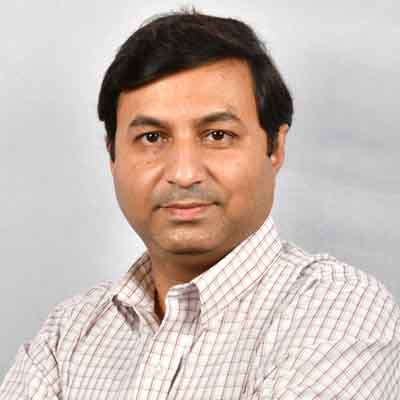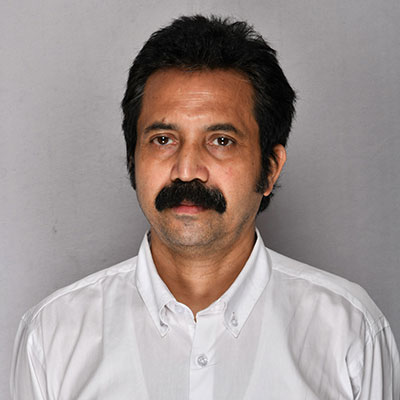B.Sc. - Cyber Security
Kolkata
3 or 4 years
UG
MAKAUT
10+2 passed in any stream from a recognized board. Candidates appearing for Class XII final can also apply.
To complete admission online, follow the steps below:
Some of the roles in the industry for Cyber Security professionals are

Amazon

Experteez

EY

TCS
Course Details for B.Sc. – Cyber Security as follows –
Kolkata, known for its rich history, culture, and educational opportunities, is an ideal destination for pursuing a B.Sc. in Psychology course in K...
Read MoreThe landscape of journalism has undergone a seismic shift in recent years. Traditional media, like newspapers, television, and radio, once the pill...
Read MoreWith digital cinema taking over, the film industry has moved from using film to using digital technology for every step, from filming to editing an...
Read MoreMeet our faculty members of B.Sc. – Cyber Security

Department of Computing & Analytics
Kolkata
Operations Research
PHD - Mgmt., MAKAUT, 2022
B. Sc. (Hons.), Calcutta University, 2000
George College of Mgmt. & Science
18.7 Years

Department of Computer Science Engineering
Kolkata
Fundamentals of Analytics, Cyber Systems and Cyber Threat and Modelling, Data Security, Data Protection in Digital Business
Data Security, Cyber Systems and Cyber Threat and Modelling, Vulnerability Analysis, PenetrationTesting, and Incident Handling, Information Security Risk Management
Ph.D. (Engineering) , Information Security, Dept. of Computer Science and Engineering, Jadavpur University
Master of Computer Applications, Computer Applications, West Bengal University of Technology
Bachelor of Computer Application, Computer Applications, Kalyani University
Techno India Institute of Technolog
6.5 Years

Department of Computing & Analytics
Kolkata
Mathematics and Statistics
Mathematical Epidemiology, Modelling of biological systems, Optimal Control
PhD, Infectious disease modelling, IIEST
M. Sc., Mathematics, IIT Kharagpur
B.Sc(Hons.), Mathematics, Calcutta University,
Dr. S.C. Sur Degree Engineering College, Dumdum
9.5 Years

Department of Computing & Analytics
Kolkata
Data Analytics, Machine Learning, Artificial Intelligence, Linux, Python, etc.
PHD - Engg. & Tech., Jadavpur University, 2017
MCA, IGNOU, 2004
B.Sc (Hons.), Kanpur University, 1998
PCMM COLLEGE
15.9 Years

Department of Computing & Analytics
Kolkata
Data Structures and Algorithms, C/C++ Programming, Web Intelligence, IT Skills, ICT in Tourism
Data Structures and Algorithms, Internet of Things (IoT), Machine Learning (ML), Quantum Computing
Master of Science, Computer Science, St. Xavier's College
Bachelor of Science (Honors), Computer Science, Calcutta University,
RSIGST (Formerly IIGST
0.7 Years

Department of Computing & Analytics
Durgapur
Digital Electronics, C , C++, Java, Python, Values & Ethics of Profession
MCA, SMU
B. A., Calcutta University
AG Church, Head - Computer
26 Years

Department of Computing & Analytics
Kolkata
Computer Architecture, Computer Graphics, Cyber Security, Unix System, Java programming, Web Technology, Python programming, Machine Learning etc.
MCA, WBUT, 2008
B. Sc. (Hons.), Calcutta University, 2005
Guru Nanak Institute of Technology
8.6 Years

Department of Computing & Analytics
Kolkata
Computer Network, Operating system, Database Management System, Software engineering, Python programming, Design Analysis and Algorithm, Object oriented programing using Java
IOT, AI, ML
UGC NET QUALIFIED
Master of Technology
Bachelor of Technology
Brainware University
5 Years

Department of Computing & Analytics
Kolkata
Inferential Statistics, Machine Learning, Bio-Statistics, Market basket Analysis, Multivariate Regression Analysis
M. Sc., Presidency University
B. Sc. (Hons.), Calcutta University
NSHM Knowledge Campus, Research Associate
7 Years

Department of Computing & Analytics
Kolkata
Cryptography, Ethical Hacking and System Defense, Malware Analysis, Computer Networking, Design and Analysis of Algorithms, Computer Architecture, Software Engineering, Graph Theory.
Cryptography/Information security/Graph theory/Artificial Intelligence.
Ph.D.(Computer Science and Engineering)
M.Tech.(IT)
BSC
Heritage Institute of Technology, Kolkata.
19 Years

Department of Computing & Analytics
Computing
Data Science & Analytics
Master of Science in Data Science and Analytics, Data Science and Analytics, MAKAUT,
Bachelor of Engineering in Mechanical Engineering, Mechanical Engineering, RTMNU,
IoTai Labs Private Limited,

Department of Computing & Analytics
Kolkata
Data Mining, Data Warehousing, Machine Learning, Python programming Language
Data Science & Analytics
MSc. in Data Science
B.Tech (Applied Electronics & Instrumentation) (MAKAUT
Bourntec Solutions Inc (worked as a Data Engineer)
1.3 Years

Department of Computing & Analytics
Kolkata
Fundamentals of Programming, Programming in C, Object Oriented Programming, Data structure and Algorithms, Database Management System, Programming in Visual Basic, Fundamentals of computing using programming ,Concepts of Image Processing etc.
M. Tech., WBUT, 2014
B. Tech., WBUT, 2012
NSHM Knowledge Campus
8.8 Years

Department of Computing & Analytics
Kolkata
Time Series, Econometrics, Quantitative Techniques, Biostatistics
Data Science, Statistics, Analytics
Masters in Statistics, University of Calcutta
B. Sc in Statistics, University of Calcutta,
Medical College, Kolkata, Statistician
4 Years

Department of Computing & Analytics
Kolkata
MATHEMATICS
SUPPLY CHAIN MANAGEMENT, GRAPH THEORY, NONLINEAR DYNAMICS SYSTEM,OPERATION RESEARCH.
PH.D(AWARDED), APPLIED MATHEMATICS, UNIVERSITY OF CALCUTTA, FULL
M.SC, PURE MATHEMATICS, UNIVERSITY OF CALCUTTA,
B.SC, MATHEMATICS HONOURS, UNIVERSITY OF KALYANI
RAJABAZAR SCIENCE COLLEGE
5 Years

Department of Computing & Analytics
Kolkata
Discrete Mathematics, Linear Mathematics, Quantitative Techniques, Basic Mathematics and Statistics, Operations Research, Research Methodology, Biostatistics, Remedial Mathematics
Mathematics and Statistics
M.Sc, Mathematics, University of Calcutta
B.Sc, Mathematics, University of Calcutta,
Budge Budge Institute of Technology
4.6 Years

Assistant Professor Department of Computing & Analytics
Kolkata
Computing Analytics
Programming
M.Tech, MAKUT
MCA, Madurai Kamraj Univercity
Institute of Computer Science
15 Years

Department of Computing & Analytics
Kolkata
Machine Learning, Natural Language Processing, Cybersecurity, Social Network Analysis, Blockchain
Ph.D (Business Mgmt.), AIMA, 2018
M. Stat., ISI, 1994
B. Sc, University of Calcutta, 1992
R S Software Ltd.
27.5 Years

Department of Computing & Analytics
Kolkata
AI, ML and Cloud Computing
AI & ML
PhD in Computer Science, UWE
MSc in Physics Gauhati University, and MSc in Computer Science ARU, UK,
BSc in Physics(Hon), Dibrugarh University
Heritage Institute of Technology, Assistant Professor
24 Years

Department of Computing & Analytics
Kolkata